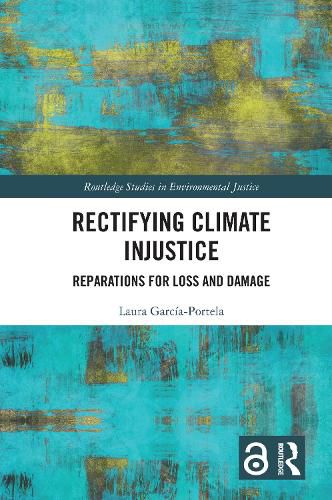Readings Newsletter
Become a Readings Member to make your shopping experience even easier.
Sign in or sign up for free!
You’re not far away from qualifying for FREE standard shipping within Australia
You’ve qualified for FREE standard shipping within Australia
The cart is loading…






This book provides an account of how rectificatory justice for climate change loss and damage can be realized by bridging the worlds of political philosophy, climate science and climate policy together. The book focuses on three fundamental questions: what kinds of climate impacts should count as loss and damage, how climate science can help us identify them and who should bear the burdens of providing reparations for loss and damage.
Laura Garcia-Portela argues that loss and damage occur after people's capabilities have fallen below a threshold of sufficiency due to the negative impacts of climate change, thereby infringing people's human rights. She argues for a historical responsibility principle for reparations for loss and damage (the Polluter Pays Principle, PPP) grounded in her Continuity Account. According to this account, responsibility for reparations is based on the duty to refrain from emissions-generating activities that would infringe people's human rights. A new duty to provide reparations arises when human rights are infringed by climate change-inducing activities. Importantly, she examines how the latest developments in attribution science can help in developing a rectificatory account for loss and damage, an approach that has not been considered in depth by climate justice scholars so far.
Striving to improve the reader's understanding of loss and damage as outlined by The United Nations Framework Convention on Climate Change, this book will be of great interest to students and scholars of climate justice, environmental justice, and environmental ethics.
$9.00 standard shipping within Australia
FREE standard shipping within Australia for orders over $100.00
Express & International shipping calculated at checkout
This book provides an account of how rectificatory justice for climate change loss and damage can be realized by bridging the worlds of political philosophy, climate science and climate policy together. The book focuses on three fundamental questions: what kinds of climate impacts should count as loss and damage, how climate science can help us identify them and who should bear the burdens of providing reparations for loss and damage.
Laura Garcia-Portela argues that loss and damage occur after people's capabilities have fallen below a threshold of sufficiency due to the negative impacts of climate change, thereby infringing people's human rights. She argues for a historical responsibility principle for reparations for loss and damage (the Polluter Pays Principle, PPP) grounded in her Continuity Account. According to this account, responsibility for reparations is based on the duty to refrain from emissions-generating activities that would infringe people's human rights. A new duty to provide reparations arises when human rights are infringed by climate change-inducing activities. Importantly, she examines how the latest developments in attribution science can help in developing a rectificatory account for loss and damage, an approach that has not been considered in depth by climate justice scholars so far.
Striving to improve the reader's understanding of loss and damage as outlined by The United Nations Framework Convention on Climate Change, this book will be of great interest to students and scholars of climate justice, environmental justice, and environmental ethics.